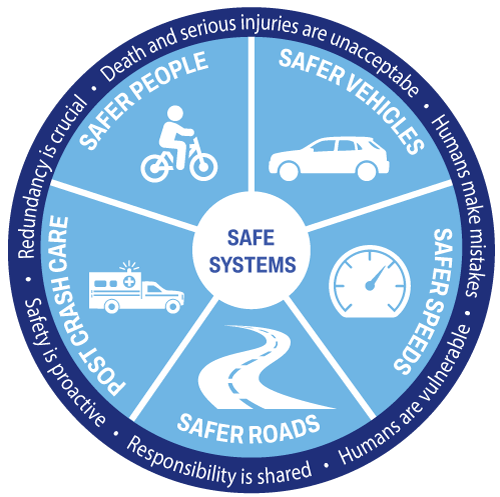Kitsap County Traffic Safety
Kitsap County is dedicated to improving traffic safety, aligning with both the Washington State Strategic Highway Safety Plan-Target Zero and the Vision Zero goals. These efforts are guided by the Safe System Approach, aiming to eliminate serious injuries and fatal collisions by 2030.
Key Objectives:
- Safer People
- Safer Roads
- Safer Vehicles
- Safer Speeds
- Post-Crash Care

Our Approach:
Using data from law enforcement collision reports, Kitsap County identifies areas where safety improvements are needed. We implement a range of solutions, from low-cost signage adjustments to large-scale capital projects, as outlined in the Kitsap County Comprehensive Safety Action Plan.
Understanding the Yellow Left Turn Display: A Guide to Safer Left Turns
The Yellow Left Turn Display traffic signal provides safer, more efficient left turns for drivers. This flashing yellow arrow replaces the circular green light at selected intersections throughout Kitsap County.
How It Works:
- Solid Red Arrow: STOP. Left-turning drivers must stop and wait.
- Solid Yellow: Prepare to stop, or if already in the intersection, prepare to complete the turn.
- Flashing Yellow Arrow: Left turns are permitted but you must YIELD to oncoming traffic and pedestrians. Proceed with caution.
- Solid Green Arrow: It's safe to turn left. Oncoming traffic has a red light and must stop. Not all signal heads include a green arrow.
Navigating Roundabouts
Roundabouts significantly improve safety by reducing conflict points and slowing vehicles, typically to 15-25 MPH. Studies from the Insurance Institute for Highway Safety (IIHS) show that roundabouts reduce overall collisions by 37% and fatal collisions by 90%.
Roundabout Safety Tips:
- Slow down as you approach the roundabout.
- Watch for pedestrians and bicycles when entering and exiting.
- Follow signs and pavement markings to guide your movements.
- Yield to vehicles already inside the roundabout. Enter when there is a sufficient gap.
- Drive counterclockwise. Do not stop or pass other vehicles.
- Use turn signals when changing lanes or exiting.
- Missed your exit? Continue around until you reach your exit.
School Safety Guidelines
School zones require extra caution to protect children and ensure a safe environment for everyone. Follow these essential guidelines to help prevent accidents and promote safe driving practices near schools.
- Slow Down in School Zones: Always follow posted speed limits and be ready for sudden stops.
- Watch for Pedestrians: Children can be unpredictable, especially near schools and playgrounds.
- Stop for School Buses: It's illegal to pass a stopped school bus with flashing red lights and an extended stop arm.
- Avoid Distractions: Stay focused on the road. Avoid phone use or other distractions.
- Follow Drop-Off Procedures: Each school has specific drop-off and pick-up rules. Adhere to these to ensure everyone's safety.
- Be Cautious Around Bicyclists: Children on bikes can be difficult to see and may not always follow traffic rules. Give them plenty of space.

